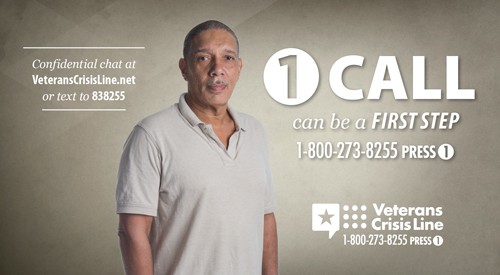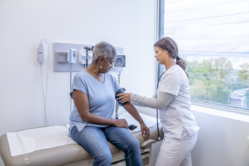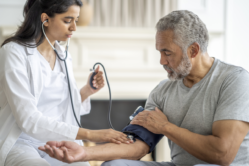The lasting scars of war are often more than skin deep, and life in the military comes with hidden challenges for troops and their families. Members of the United States Armed Forces (and their families) are some of the proudest people I have ever had the pleasure of knowing. But with that pride can come a fear of seeking help. Whether they’re afraid for their career, or of the social stigma that comes from seeking mental health services, or they find a personal provider is too cost-prohibitive, too many members of our Armed Forces aren’t getting the help they want, deserve, and need.
Military members and veterans have access to mental health care through the military and often through the VA. However, some military members or veterans may choose to look elsewhere due to confidentiality reasons, or the availability in their local area.
To fill this gap, many government programs and non-profit organizations offer free, discreet, and easily accessible counseling services for troops and their families.
If you, your friend, or a family member are in need of mental health services, reach out to one of the following organizations. They will discreetly get you the help you’re looking for, or direct you to an organization in your area that may be able to provide assistance.
Official Resources for Active Duty Members and Their Families
Current military members and their families can seek assistance through several methods. Military One Source. lists several options, including the base chaplain, Tricare, or the nearest Military Medical Facility, Combat Stress Control Teams, The Family Advocacy Program, the VA, or Outside military support channels. Members can also call Military OneSource at 1-800-342-9647 to learn about more confidential help options for military members and their families.
ADVERTISEMENT
Department of Veterans Affairs Mental Health Options
The VA does offer assistance to all veterans, including the following:
The Veterans Crisis Line offers veterans the opportunity to chat confidentially and anonymously with a counselor at any time either online or over the phone. You don’t even have to give your real name. With the veterans crisis line, you decide what type of help you wish to receive. You can ask for a referral to see a counselor in person, or you could choose to do nothing else at this time. The Veterans Crisis Line offers a self-check quiz to help you assess what type of services you may need.
Veterans and their loved ones can call 1-800-273-8255 and Press 1, chat online, or send a text message to 838255 to receive confidential support 24 hours a day, 7 days a week, 365 days a year. Support for deaf and hard of hearing individuals is available.
National Call Center for Homeless Veterans: If you are a Veteran who is homeless or at risk of becoming homeless, you can contact the National VA Call Center 24/7 at 1-877-424-3838 (also intended for Veterans families, VA Medical Centers, federal, state and local partners, community agencies, service providers and others in the community). You can also chat live online 24/7 through the Homeless Veterans Chat service.
DoD/VA Suicide Outreach: Resources for Suicide Prevention: You will find ready access to hotlines, treatments, professional resources, forums, and multiple media designed to link you to others. This site supports all Service Branches, the National Guard and the Reserves, Veterans, families, and providers.
DCoE Outreach Center: The Defense Centers of Excellence for Psychological Health and Traumatic Brain Injury (DCoE) runs a resource center that provides information and resources about psychological health (PH), post-traumatic stress disorder (PTSD), and traumatic brain injury (TBI). The center can be contacted 24/7 by phone at 866-966-1020, by e-mail at [email protected], or you can also go to DCoE Outreach Center Live Chat.
Non-Military Organizations
The following organizations also offer assistance to military members, veterans, and their families. As always, these organizations offer discretion and privacy.
ADVERTISEMENT
The Soldier’s Project
The Soldiers Project is a 501 (c) (3) non-profit organization, “dedicated to providing free, confidential psychological services to US military veterans and their loved ones who have served at any time after September 11, 2001.”
The Soldier’s Project helps service members, their spouses, parents, children, friends, colleagues, and distant relatives, because, “when a soldier goes to war, his loved ones go to war with him.” The mental health professionals that work through The Soldier’s Project know the toll that war pays on an individual and their families, and they help provide the necessary support to give service members as smooth a transition as possible back to family and civilian life.
Help through The Soldier’s Project is 100 percent free and confidential. Find a location nearest to you or contact the organization to discuss a plan for your needs.
Give an Hour
Give an Hour (GAH) is a nonprofit 501 (c)(3) organization whose mission is,” to develop a national network of volunteers capable of responding to both acute and chronic conditions that arise within our society.” Currently, GAH’s focus is on meeting the mental health needs of troops who have served in the Iraq and Afghanistan conflicts, as well as their families.
They provide counseling and treatment for anxiety, depression, substance abuse, PTSD, traumatic brain injury, loss and grieving, and more. They also work to reduce the stigma associated with mental health.
GAH helps you get help by putting you in contact with a provider who will offer their services completely free of charge. Absolutely no insurance information will be exchanged for you to receive help.
ADVERTISEMENT
The Camaraderie Foundation
The Camaraderie Foundation provides counseling assistance for military service members and/or their immediate family members that actively served in the Armed Forces after September 11, 2001. Their mission is to, “provide healing for invisible wounds of war through counseling, emotional, and spiritual support.”
In order to be considered for their services, you need to fill out an application for assistance. All branches of military service, veterans, and their families are eligible to apply. If you qualify, The Camaraderie Foundation will provide 100 percent free counseling services as a supplement to what is offered by the military. You’ll have private counseling conducted by licensed professionals.
The American Red Cross
The American Red Cross also offers confidential counseling help to all military members and their families. Your local Red Cross will connect you to a counselor through their network of community resources available worldwide.
The American Red Cross Emergency Communications Center is available to help 7 days a week, 24 hours a day, you just need to call this toll free number: (877) 272-7337 FREE. You can also go online to use their referral services.
SAMHSA – Substance Abuse and Mental Health Services Administration
The Substance Abuse and Mental Health Services Administration (SAMHSA) is an agency within the U.S. Department of Health and Human Services. One of their core goals is to reduce the impact of mental illness on Americans. As such, they have many free or affordable services available to veterans and their families.
They have a behavioral health treatment services locator. Use your zip code to find information for yourself or anyone you know who may be seeking mental health treatment. You can also Contact SAMHSA. They have business hours for their offices, as well as hotlines you can call at any time.
Utilize the Available Resources
Know that you don’t have to suffer in silence. Utilize the counseling services available not only to you as the military member, but for family and couple counseling as well, and improve your quality of life.
If you recognize the signs of PTSD or anxiety in yourself, a friend, or a family member, please know that there are resources available to help. You are not alone, and there are people, counselors, and organizations that want to assist military members and their families.
Image credits: 1- StockUnlimited, 2 – VA.





Comments:
About the comments on this site:
These responses are not provided or commissioned by the bank advertiser. Responses have not been reviewed, approved or otherwise endorsed by the bank advertiser. It is not the bank advertiser’s responsibility to ensure all posts and/or questions are answered.
Steve says
i think its great the mental health care that veterans are getting now. but it seems to me as i search the internet for help, that many are focusing on veterans that served in afganistan/iraq or were affected by 9/11.
that leaves those of us that did not serve in the wars, or served before 9/11 out in the cold to deal with the crap care the VA provides. sorry if this sounds harsh, but it’s true.